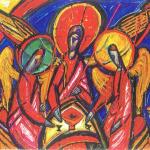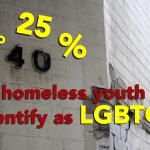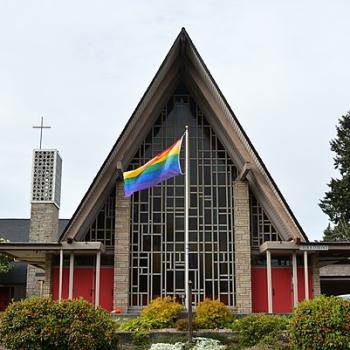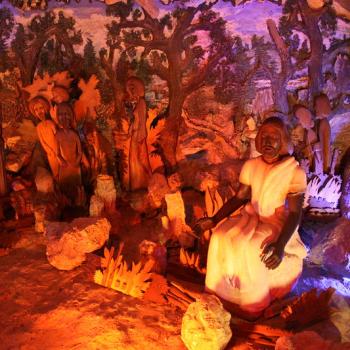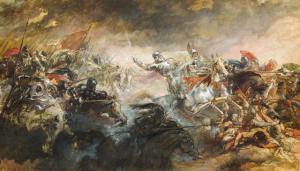
Where Do We Go From Here?
This is a question the newly healed ex-demoniac must ask. After living so long in agony, Jesus has healed him. Naturally he wants to follow, but Jesus says no. He must stay with the community that had bound and ostracized him, the community that is more frightened than relieved to see him healed and whole. Where does he go from here?
It’s a question the Garesenes must ask. A source of income that may have been crucial to their economy — a herd of pigs — is gone. But more than that, they have lost their scapegoat, the demonized man against whom they could feel righteous, dignified, human. Powerless against Rome, they at least had recourse to a madman against whom they could feel superior. No more. Where do they go from here?
And it’s a question we must ask as a world built on violence self-destructs all around us. How long will we consume the poison of dehumanization, force it upon others, and let it contaminate our world? Can we live without the scapegoating, dehumanization, and enmity that seem to give our lives meaning even as they tear us apart? Can we live without our demons?
Where do we go from here?
The healing of the demoniac is a story of hope, but also a call to repentance. A world built on violence will crumble. Will we cling to our demons and fall with it? Or will we build a new world on a foundation of compassion?
The Horror And The Healing
A “legion” is a unit of 3,000 to 6,000 Roman soldiers. In other words, it’s the violence of the Roman Empire that torments the demoniac. All the brutality and bloodshed of conquest, slavery and oppression internalized in one man, mutilating the body, maddening the mind.
This story is symbolic, but also all too literal. War wreaks this devastation and trauma on people all the time. Death can rage within long before someone actually dies.
But the violence he faces comes not only from Rome. The demoniac is doubly tormented— oppressed by Romans and scapegoated by his own community.
For all the demons to be concentrated in one man rather than spread through the community symbolizes a sacrificial societal structure. The Gerasene community undoubtedly felt the burden of being a subjugated people. But that burden was mitigated by the presence of the demoniac, their scapegoat. Effectively, they passed the violence of Rome onto him, in the way violence reproduces itself onto the more vulnerable. Against him, they measured their sanity and stability. Against him, they could inoculate themselves from utter humiliation.
What does it take to dissolve the demons of self-loathing that come from a lifetime of violence and isolation?
When Jesus commanded the demons to depart, the man suffocated by them felt unconditionally and perfectly loved for the first time. Simply by virtue of his humanity, he was worthy of healing and the inherent dignity that neither Rome nor rejection could revoke.
Jesus expels the horrors that come from living life at the expense of others. Rome trampled the world, crushing and subjugating underfoot. The Gerasenes succumbed to that violence and measured themselves against their own most vulnerable.
And Jesus exposed the self-destructive nature of such a violent system when he cast the “legion” into the pigs.
On Pigs And Powers and Profits Over People
A word about those pigs.
I think it’s highly likely that the pigs were raised for Roman consumption. Feeding the violence of the Roman Empire… at the expense of the people.
At least at the expense of the demoniac.
I am reminded of how systems of violence rob from the most vulnerable in so many ways beyond death, injury, and destruction. The more resources are expended for the defeat of enemies and the maintenance of control over others, the fewer resources are available for the needs of the people. “Every gun made, every warship launched, every rocket fired signifies, in the final sense, a theft from those who hunger and are not fed, those who are cold and are not clothed,” as Eisenhower said.
The sentiment extends beyond weapons. Anything that upholds a system where the power — military, economic, social, psychological, any power — of some comes at the expense of others, rich over poor, privileged over persecuted — is an instrument of violence.
The pigs represent a profit-and-power-over-people oriented society.
And that kind of society can only pass pain along so long before it hurls itself to destruction. Jesus cast the demons into the pigs, and the pigs embodied the self-destructive violence.
In my head canon, the pigs themselves, though not the demons, survive in a “Jonah”-type scenario, saved from those who would slaughter and consume them. Because the whole story is about saving everyone from being slaughtered and consumed in a sacrificial system where violence begets violence until it violently exhausts itself.
The people were more afraid to lose the pigs than to regain the newly healed man. Are we any different? Are we truly ready to care for the most vulnerable among us? Or are we more moved by power and profit?
Are we ready to repent of judgmentalism, marginalization, scapegoating, and neglecting the needs of the most vulnerable?
Are we ready to exorcise our own demons?
Reclaiming Our Humanity By Repenting Of Dehumanization
The newly healed demoniac wants to follow Jesus. But in his case, following Jesus means staying behind.
For the demoniac to follow Jesus, to do the same healing work that Jesus has done for him, he must stay in his community and give them the opportunity to repent of dehumanizing him by seeing him in his full humanity. And he must seek to ensure that the violence that plagued him isn’t passed on to anyone else.
Can the Gerasene community subvert the violence of Empire by building an economic system that does not accommodate or exacerbate violence? Can they let the violence of Rome exhaust and extinguish itself without participating in it?
Can we?
For we also live in a world of demons, saturated with violence, dehumanization, and greed. And the United States, built on stolen land by stolen labor, is the new Rome.
Can those of us with power and privilege see our complicity in a system of greed and dehumanization? Can we repent of the weapons and violence and war that we export throughout the world and fetishize here at home? Can we see the vulnerable and marginalized as full, beautiful, beloved human beings?
Instead of passing along the violence that saturates our world, can we let our violence dissolve in love? Can we recognize the way harming others ultimately harms ourselves? Can we truly recognize our interconnection rather than living in ways that sever us from one another?
Jesus taught us how to subvert the powers of imperial violence. He showed us in the parable of the mustard seed and the feeding of the 5000 that we have the resources to feed one another. He taught us in his many healings that we are to care for each other.
We live into our full humanity by exorcising our demons of violence, dehumanization and greed that make us strive to live over and against others, or resign ourselves to living beneath others. Living not at the expense of anyone, but in care for everyone. We have so much work to do to get there. But we must learn to live without our demons.
Truly, it’s the only way we can live at all.
Image: The Phantom Horseman, 1870-93 by Sir John Gilbert (d.1897) via Unsplash

